Overflowing with living water
Healing Hands International was born on the Lipscomb campus just over 30 years ago, and has grown into a worldwide force for good.
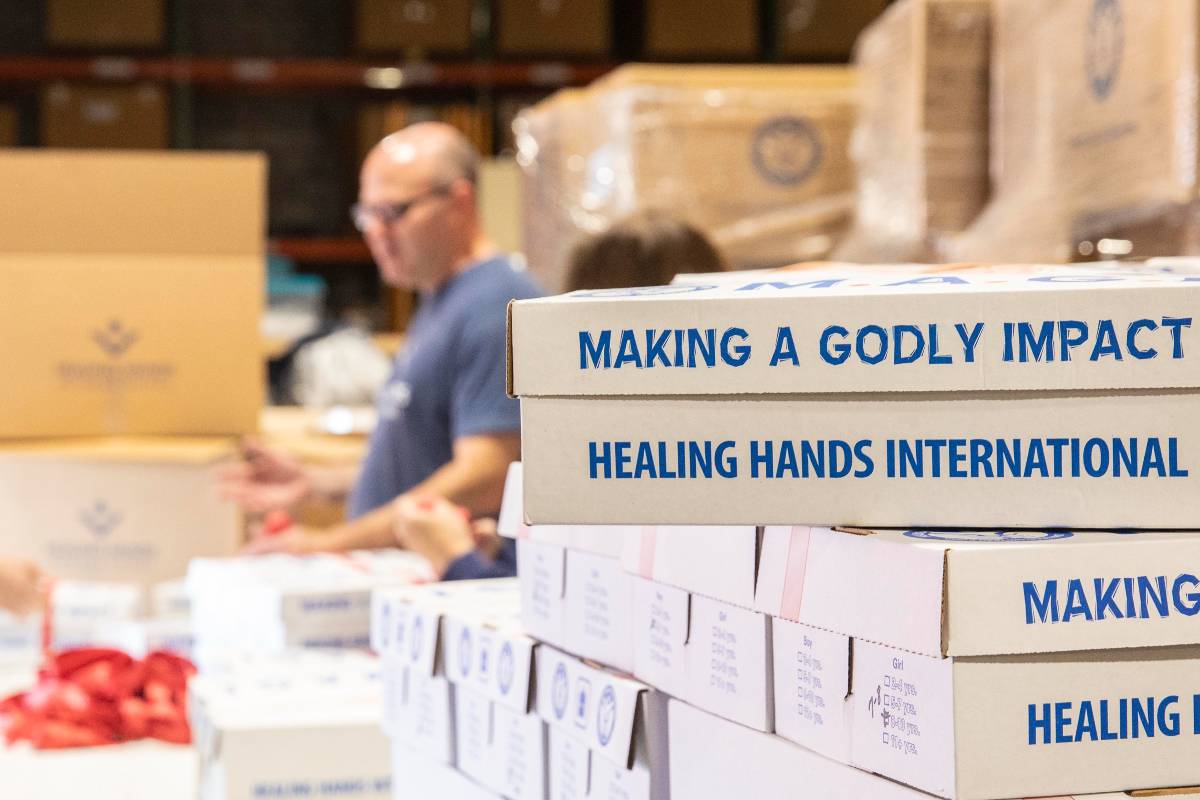
Posted Aug. 11, 2023
By Janel Shoun-Smith (LA ’89)
Healing Hands International (HHI), a Nashville nonprofit that aids, equips, and empowers those in need around the world, has been overflowing its confines with Christian love and service since before it was even established.
Healing Hands (www.hhi.org) was born right here on the Lipscomb campus in 1991 when then-business faculty Randy Steger challenged his marketing students to create a marketing and business plan for a humanitarian effort. The students decided to collect and send medical supplies to Eastern Europe, and it wasn’t long before the fruits of the students’ labor outgrew the classroom where they were storing donations.
As part of the project, the students researched the needs and presented them to hospitals, doctors, pharmaceutical companies and other potential donors by organizing in-person informational presentations, designing brochures and creating videos.
Craig Chumley (BA ’93), one of 20 students in Steger’s class, said in a 2007 article: “I spent most Sundays speaking to various adult classes throughout the local Nashville church community.”
By the spring semester, Steger was stashing donations on the stage of Collins Alumni Auditorium, but the response outgrew that storage plan as well. So Steger got permission to have a couple of trailers brought to campus parking lots. He also got permission for students to spend their chapel time moving all the medical supplies and equipment into the trailers, a task that was captured in a photo still displayed at today’s HHI headquarters in Nashville.
According to The Tennessean in December 1991, the marketing class shipped more than $300,000 worth of medical supplies to Eastern Europe. The project also lit a fire under Steger, who by 1993 had joined a group of local Nashvillians to incorporate Healing Hands International, modeled after the students’ plan.
“Projects are supposed to go through steps and end, but this one just wouldn’t go away,” said Steger, who joined the faculty in 1983 and doubled as professor in the College of Business and president of HHI until he retired from HHI in 2012 and from Lipscomb in 2015.
“All the time I was going to people with special expertise at Lipscomb to ask for advice on what to do,” said Steger. “I used the science department to test water filters. I was trying to learn about the nonprofit world, and Charles Frasier (BS ’66 )gave me advice on accounting and taxes. The communications department helped me put together video tapes to promote the organization. The pre-med program provided medical expertise on what would be good supplies to collect. Dr. Phil Choate (BA ’69) volunteered a lot of his time. It was a little bit of everything. I really appreciate all the ways Lipscomb helped.”
Were you involved with Healing Hands as a student?
Comment and share your Healing Hands stories here.
Share Your Story!
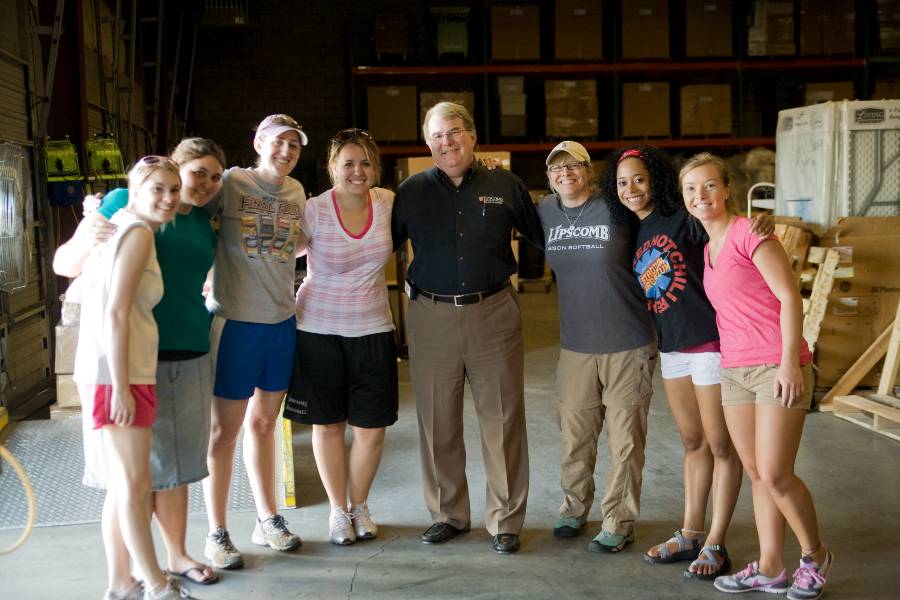
Retired Lipscomb faculty Randy Steger (center) with Lipscomb student volunteers. Steger, founder of Healing Hands, doubled as a professor at the College of Business and president of HHI.
In its youth, the organization worked through congregations of the churches of Christ to collect, ship and distribute medications, medical supplies and equipment, agricultural aid, school supplies and other items to the disadvantaged nations around the world.
Over time, it evolved into a force to empower communities to better themselves by providing trainings; sustainable sources of water, food and income; and disaster relief. Lipscomb alumni have been front and center in that evolution of Healing Hands from its beginning to today.
“If it wasn’t for Lipscomb, I’m pretty sure HHI wouldn’t exist,” said Joseph Smith (BS ’96), vice president of operations. Of the eight alumni currently on HHI’s U.S. staff, Smith is the one who has worked at the organization the longest, since 1999, when there were only four or five people on staff, he said.
In the beginning, HHI played a crucial role for churches of Christ, said Smith. Many congregations wanted to provide aid to the needy overseas, but the maze of shipping regulations and customs laws, and the expertise needed to send the right equipment or resources for a different culture and geographic environment was beyond their capability as individual churches. HHI learned how to fill that gap well, he said.
“The Church has a lot of good people in it, and they are all over the world, wanting to know what they can do to make a difference in someone’s life,” said Steger.
In one of the organization’s first projects, Smith and the late David Goolsby (A ’66), who became HHI’s director of international agricultural development and relief, helped Manna International figure out the best way to ship a water well drilling rig to Ethiopia, by sourcing the parts in the U.S. and shipping it over piece by piece. So HHI used what they learned in that experience to send more drilling equipment to other nations.
The Church has a lot of good people in it, and they are all over the world, wanting to know what they can do to make a difference in someone's life. — Randy Steger
But then over time, the leaders of HHI saw a need to overflow again. Water wells began to need repairs, various societal conflicts arose which blocked the use of the water for everyone in the community and the changing economy and relief practices would discourage people from farming for their own sustainably, Smith said.
Over the years, HHI shifted to equipping and empowering communities to take care of their own equipment, to collaborate to govern the use of resources themselves, to utilize tried and true farming techniques their grandparents used and to establish their own small businesses that work for their particular community.
“We strive to help, but we want the communities to be sustainable,” said Smith, “and everything revolves around creating a better environment for sharing Christ. If we provide clean water to a community, but if we don’t introduce them to the living water, then we have missed an opportunity.”
Today HHI has five main programs:
- The Clean Water program provides water wells and water filtration systems for communities without access to a source of safe water;
- The Hunger to Harvest program equips communities to fight hunger through basic gardening techniques that can be used even in drought prone areas;
- The Women of Hope program empowers women around the world through education, business training and microfinance;
- The MAGI Project meets the physical needs of children living in poverty while sharing Jesus with their families and communities; and
- The Disaster Relief program assists when tragedy hits and provides supplies to those in developing countries.
We strive to help, but we want the communities to be sustainable, and everything revolves around creating a better environment for sharing Christ. If we provide clean water to a community, but if we don't introduce them to the living water, then we have missed an opportunity. — Joseph Smith
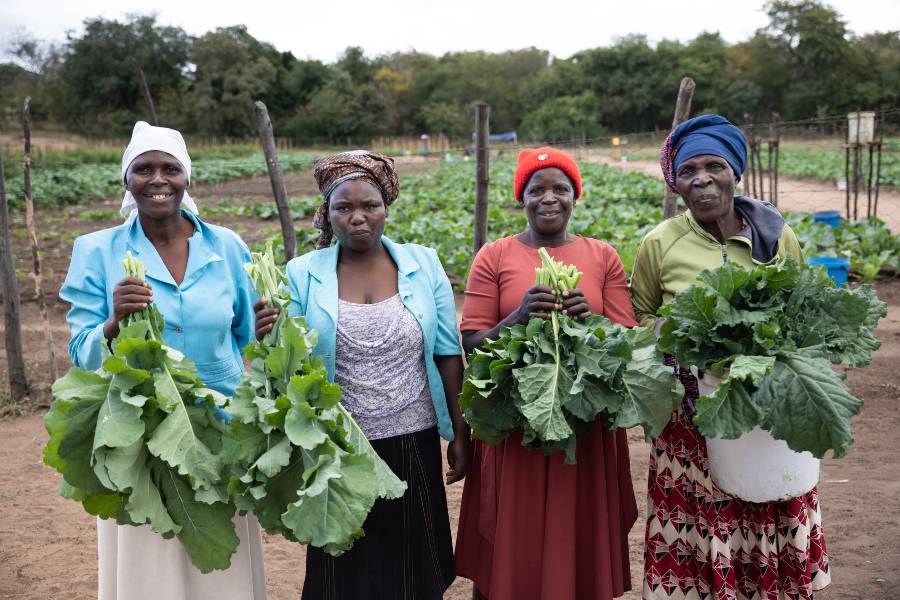
HHI's Hunger to Harvest program equips communities to fight hunger through basic gardening techniques in drought prone areas.
HHI’s connection to Lipscomb University has remained strong to this day, with around 40% of its U.S. staff in 2023 made up of Lipscomb alumni. In addition to Smith, the Nashville offices include:
- Chris Gingles (BS ’69), vice president of finance
- Scott Saunders (BA ’77), donor impact director
- Linda Brock (BS ’82), administrative assistant
- Angela H. Bell (BS ’98), administrative assistant, donor services
- Mark Jent (BS ’00, MBA ’09), MAGI Project director
- Grace Boucher (BSW ’21, MBA ’22), Women of Hope, donor and community coordinator
- Katia Hanger (BS ’22, MBA ’23), data analyst
Today’s HHI staff represents just a small fraction of the Lipscomb alumni and faculty who have helped make the organization effective over its 30 years.
For example, Goolsby spent years designing workshops and vocational education to teach community leaders around the world how to provide for their own needs through simple sustainable agriculture and technologies such as drip irrigation and survival gardening. After his first trainings in Ethiopia in 1999, a nationwide interest in drip irrigation grew all across that nation.
Kent Birdwell (BA ’99) volunteered in 2005 to help conduct a feasibility study for building a factory to produce a vitamin-fortified infant formula substitute. His brother, Jake Birdwell (BS ’00) was part of a team conducting a financial assessment of the damages from the 2004 tsunami in Sri Lanka and India.
Some years ago, Dr. James Parnell (’06), attending physician at the emergency room for Sumner Regional Medical Center and frequent Lipscomb mission team leader to Baja, Mexico, requested N95 masks from HHI for a clinic in El Zorrillo where team members frequently saw patients with possible or diagnosed tuberculosis. He really only needed a few, but HHI sent 100.
The clinic put them in storage and when the Covid-19 pandemic hit, Parnell coordinated with the clinic personnel to distribute the N95 masks, as well as other crucial personal protective equipment to health care providers in the region.
“When I and my team brought in over 100 donated N95 masks, I had no idea why we were bringing so many at the time. Clearly, God had a bigger plan He was preparing for and I’m glad we got to be a part of it,” said Parnell.
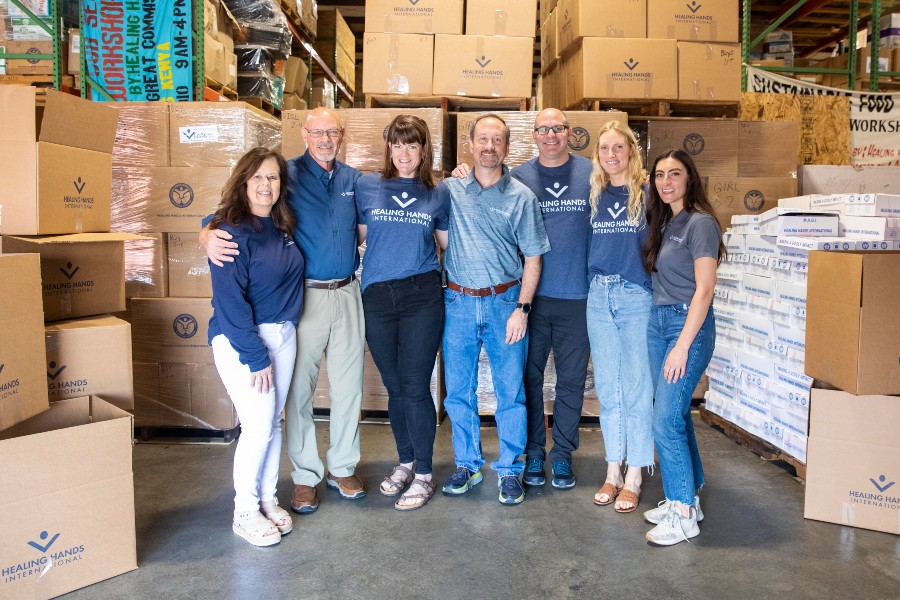
Forty percent of HHI's U.S. staff is made up of Lipscomb alums. Pictured here are seven of the eight alumni who are current employees.
When I and my team brought in over 100 donated N95 masks, I had no idea why we were bringing so many at the time. Clearly, God had a bigger plan He was preparing for and I'm glad we got to be a part of it. — James Parnell
Burt Nowers (BS ’79), served as president of HHI from 2012 to 2016, and was a member of the board beginning in 2005. During his for-profit business career, Nowers had been involved in entrepreneurial companies, so he brought that experience to HHI, using his accounting and finance background to run HHI’s microfinance and business training programs.
Then in 2017, he brought the international non-profit experience he gained at HHI back to his alma mater to serve as a CEO-in-Residence for the College of Business’ Center for Business as Mission.
“As Americans we have a huge impact everywhere we go. So we need to make sure it is a positive impact. Even with my business background, I probably didn’t appreciate all that until I went over to Healing Hands,” said Nowers.
On top of the countless alumni who have been involved in HHI efforts over the years, at least two decades of students have visited the HHI warehouse on Service Days or other university-sponsored service opportunities. In 2022, the university revived Beautiful Day and offered a bevy of on-campus activities, including packing five-gallon buckets full of necessities for HHI to send to war-torn Ukraine.
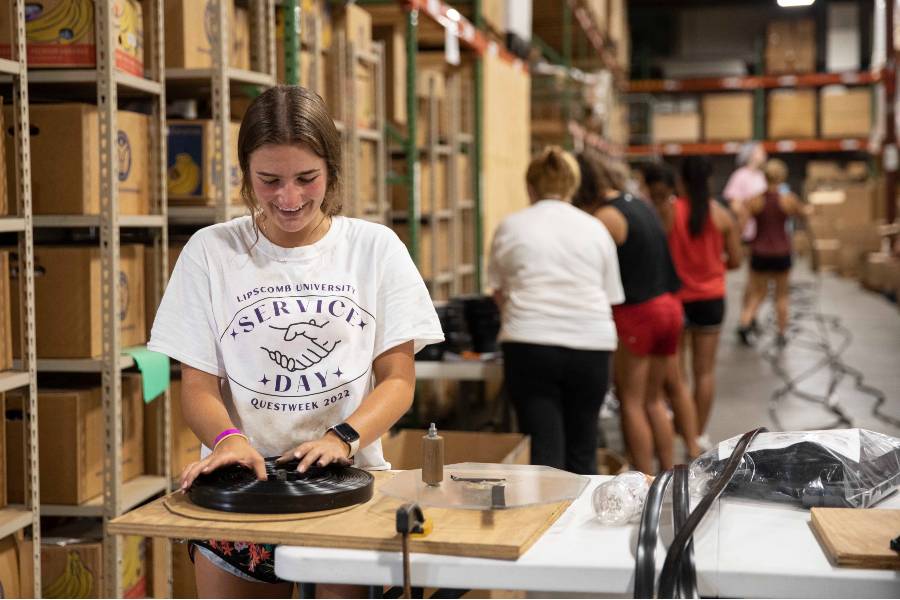
The Healing Hands warehuse has been a popular choice for students participating in the university's annual Quest Week and campus-wide Service Days, held for decades.
The two newest Lipscomb alums to join the Healing Hands teams, Boucher and Hanger, both came to their positions through the College of Business’ directed work experience program for MBA students. Students are placed in nine-to-ten-month internships in local companies, with a focus on a specific project to bring real value to the company.
During her internship, Hanger, who worked full time at HHI this past summer, became the leader of a project to implement a data collection and analytics process using the software platform mWater. She spent months learning the nuances of the software as well as learning about the programs and processes at HHI to build and implement an efficient data protocol.
“I knew the successful implementation of mWater could change our organization and further our impact. That knowledge motivated me throughout the project,” she said.
Through surveys for each of HHI’s programs, Hanger created a more streamlined process for data collection and used the information collected to build interactive maps and digital tags for project sites, an easy way to see completed projects’ key performance indicators and dashboards with interactive charts, diagrams, photo mosaics, maps, calendars and self-updates with new data.
“It’s hard to put into words the joy I feel getting to talk with people in other nations each day and to work together to further the work of the Kingdom. When I see messages from people in Kenya, Zimbabwe, Malawi, India and many other countries, I can’t help but smile,” she said.
It's hard to put into words the joy I feel getting to talk with people in other nations each day and to work together to further the work of the Kingdom. When I see messages from people in Kenya, Zimbabwe, Malawi, India, and many other countries, I can't help but smile. — Katia Hanger
Boucher was assigned as interim marketing coordinator for one semester in the fall. Then her internship was continued and she worked with the Women of Hope program in the spring term. She ended up being hired as the donor-facing coordinator of the program.
Women of Hope is an entrepreneurship program that teaches women how to run a micro-business; how to pick products, to use materials they already have, set a budget, keep a ledger and price products, among other concepts, said Boucher. HHI also gives micro-loans and nurtures groups of women from the same village to pool their resources into a micro-business, she said.
“I love the focus on being sustainable,” said Boucher, who was first introduced to HHI through a service field trip when she was a sophomore. “They do a great job of putting things in place to help people help themselves… Instead of handing things out, it is giving them a hand up. I love that focus on holistic development.”
It is a unique experience to be able to share a spiritual life with co-workers, she said, noting the staff's morning devotions together. “To be in a place where everyone has the same mission and the same goal has been really special,” she said.
To be in a place where everyone has the same mission and the same goal has been really special. — Grace Boucher
Steger is proud to see the organization focused on sustainable impact and sustaining itself. Crafting an organization in a way that it survives beyond its initial driving force is a key concept in business, said the former marketing professor. From the beginning, he tried to bring successful business concepts to the operation of Healing Hands, he said.
“In business, you don’t want to just treat symptoms, you try to address the real problems,” said Steger. “People were drinking dirty water or were malnourished. So we started adding to our ministries in order to solve the root problems.”
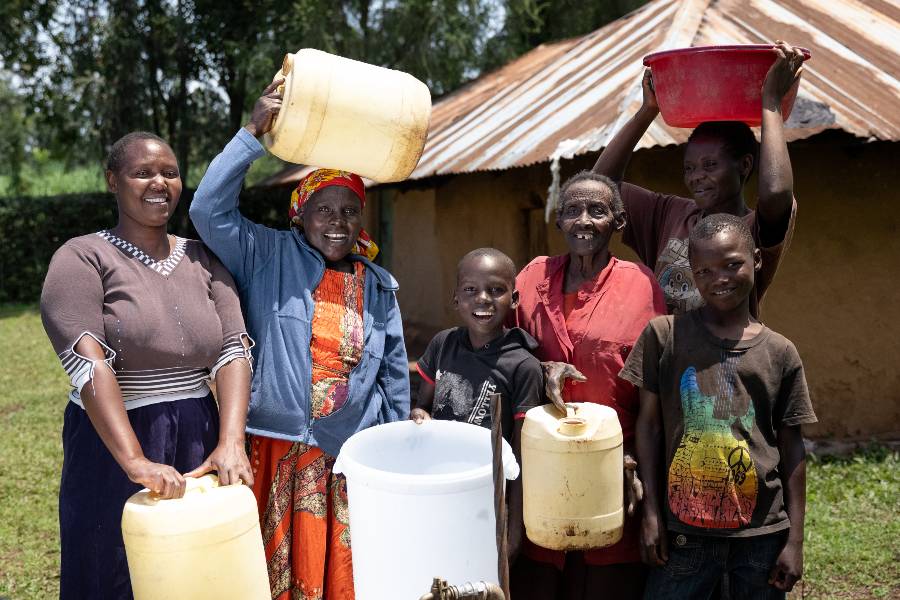
HHI's Clean Water program provides water wells and water filtration systems for communities without access to safe drinking water.
Were you involved with Healing Hands as a student?
Comment and share your Healing Hands stories here.
Share Your Story!